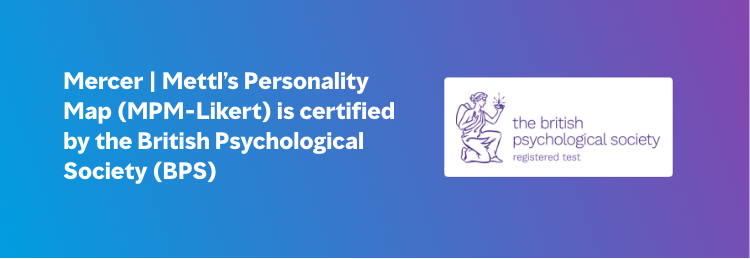Mercer | Mettl Personality Profiler (MPP) is modeled after the Big Five theory, which specifies that people can be described based on their standing on five broad personality traits. The tool helps measure a person’s strengths and growth opportunities based on underlying personality traits and work style preferences, assisting employers in understanding what behaviors a candidate is likely to engage in due to his/her preferences and pre-dispositions. Moreover, organizations can pair it with other tools to provide a more holistic understanding of the individual’s pre-dispositions and behavioral manifestations at work.
Mercer | Mettl’s scientists went beyond the well-established model of the broad ‘Big Five’ personality factors and developed 26 scales or narrower facet-like constructs, which form the building blocks of our assessment. These scales span a vast personality domain and are mapped to an organization’s or job role’s specific performance models or behavioral competencies to predict job success. The ‘Big Five’ personality traits predict important job-related outcomes, such as job performance, a person’s potential for burnout, trainability and job satisfaction.
The five factors are:
- Extraversion (outgoing/energetic vs. solitary/reserved)
- Openness to experience (inventive/curious vs. consistent/cautious)
- Emotional stability (secure/confident vs. sensitive/nervous)
- Agreeableness (friendly/compassionate vs. cold/unkind)
- Conscientiousness (efficient/organized vs. easy-going/careless)
While MPP can be used as a filtration tool, it can also be used as a key input for critical HR decisions such as:
- Learning and Development – understand the current proficiency level of the employee; train and develop them effectively
- Identification of high-potential – build a healthy pipeline of future leaders
- Succession planning – fast-track high potential talent to retain them
Mercer | Mettl Personality Inventory
Mercer| Mettl personality inventory (MPI) tool is an innovative, evidence-based assessment, which measures relevant personality traits required for a particular role. It helps predict behavioral competencies, which in turn lead to organizational outcomes of interest. It is designed to help employers gain access to objective information about a job applicant or an employee, which is critical in influencing their behavior at work. It is most suited for entry-level roles and measures positive personality traits.
MPI can be mapped to any job role using Mercer| Mettl Competency Framework (MCF) or any organization’s specific competency framework. It is built to allow users (client/companies) to customize its configuration and scoring to fit their needs. Besides, it provides reports designed to facilitate the hiring decision for key stakeholders. The standard report presents the test-taker’s scores on eight critical competencies and seventeen sub-competencies.
Mercer | Mettl Dark Personality Traits Test
These personality assessment tools measure negative personality constructs in potential hires (during the hiring process) and existing employees. This personality diagnostic helps ensure workplace safety. The tool considers six dark personality traits: Opportunism, Self-Obsession, Insensitivity, Temperamental, Impulsiveness and Thrill-Seeking.
- Opportunism – a tendency to be deceitful and manipulative
- Self-obsession – a tendency to possess an inflated sense of self
- Insensitivity– a tendency or inability to understand others’ pain and perspectives
- Temperamental – a tendency to become angry at the slightest provocation
- Impulsiveness – a tendency to act on a whim with no forethought
- Thrill-seeking – a tendency to do activities perceived as risky but rewarding
Thus, the tool helps safeguard work culture and ensure customer safety in industries where employees working in customer-facing roles may exhibit dark traits, endangering customer, asset and data safety.
Mercer | Mettl Sales Profiler Tool
Mercer | Mettl’s sales profiler is a well-designed tool to identify people with a knack for sales. In addition, the tool can assess the behavioral and cognitive competencies required for the sales profile, enabling recruiters and employers to build a winning sales team. This psychometric assessment tool helps evaluate a salesperson’s true potential for each job role, from selling shoes in stores, to complex IT solutions to CXOs.
Motivation, Values and Preferences Assessment
This comprehensive personality assessment tool helps employers understand what drives and motivates a person to perform and excel at work. The more motivated and engaged the workforce is, the greater is the organization’s potential for success. This tool assesses an individual’s motivation to excel in a job role based on key motivators, such as finances, security, recognition, affiliation, competition, power, advancement and achievement.










 Behavioral Competencies
Behavioral Competencies Cognitive Competencies
Cognitive Competencies Coding Competencies
Coding Competencies Domain Competencies
Domain Competencies






















































